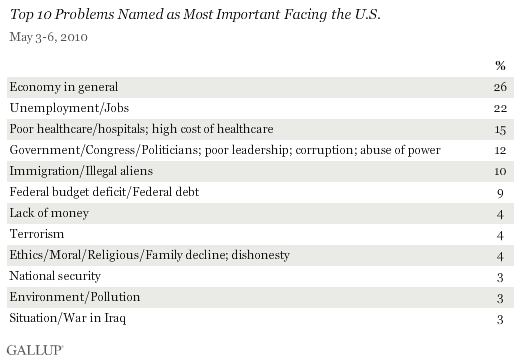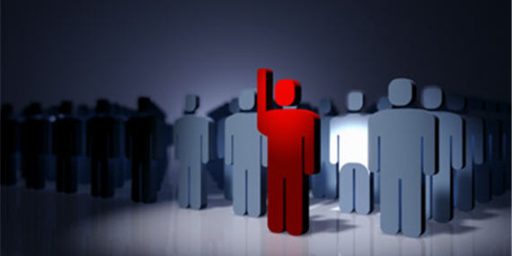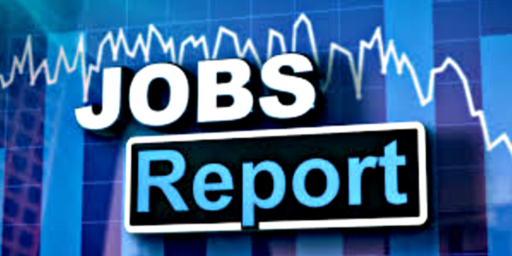America’s Top Problems: Economy and Jobs
When I saw the Gallup headline “‘Jobs’ Drops to No. 2 on Americans’ List of Top Problems,” I was skeptical. What could have topped Jobs with unemployment hovering at 10 percent and no real prospect in site for improvement?
Lydia Saad (a family friend) answers:
After two months as the clear No. 1 perceived problem facing the country, unemployment/jobs dipped to No. 2 in May, while “the economy” in general moved back into the top position. At the same time, Americans grew more likely to name immigration (including illegal immigration) as the nation’s most important problem, moving that issue into fifth place.
Isn’t “Unemployment/Jobs” inseparable from “Economy in general”? I mean, the reason we have high unemployment is that the economy is in sad shape. It’s just the flip side of the same coin.
But Jeffrey Jones reports when giving the March figures:
Unemployment now stands alone as the top issue in Gallup’s latest update on the most important problem facing the country. Thirty-one percent of Americans mention jobs or unemployment, significantly more than say the economy in general (24%), healthcare (20%), or dissatisfaction with government (10%).
[…]
The economy had ranked No. 1 in Gallup’s monthly most important problem measure since February 2008, when it overtook the Iraq war. The war in Iraq had been the top issue (or tied for the top) each month since April 2004. Thus, unemployment’s position at the top of the list marks the first time in six years that something other than Iraq or the economy in general has led Americans’ list of national concerns.
If there was a poll on this question in April, I can’t find it. But, in a matter of two months, the percentage listing unemployment as the top issue decreased 9 percent — well outside the margin of sampling error. The wild deviations are interesting and must mean something. Maybe “Economy in general” is a more vague sense of dread and “Jobs” is more personal? That is, maybe there was a spike in people fearing for their own job and their ability to replace it that’s now subsided?
Or maybe it’s something else? Health care is the top issue for 15% of the people, nearly double the 8% that listed it in March. And, yet, health care reform was all over the news in March and has now moved to the back burner. Is there a lag effect?
Even more oddly, the environment has dropped to 3% from 11% in March, meaning roughly four times fewer people cited it as their top concern. And this despite the recent poll taking place smack dab in the middle of a disastrous oil spill right off the American coast. Shouldn’t the numbers have moved the other way?
Could it be that these questions are meaningless? That people don’t really think in terms of “top problems” and just give random answers? Because I can’t think of a better explanation for these shifts offhand.







How many top concerns can a human mind hold?
I don’t think its more than 2 or 3, and so longer term problems can be pushed off our list by crises.
I’m sure that’s true. But wouldn’t you think Environment would be more likely to be The Top Problem in the middle of this oil spill mess than it was in March, rather than a fourth of what it was then?
Maybe they should poll people about their level of surprise about the oil spill. My own reaction rolled pretty fast from “really?” to “well, that’s what’s going to happen with these deep wells.” Or “I guess I knew that already.”
I see people (the less environmental) accepting these costs.
Given that government/congress/politicians/poor leadership are the cause of most of the others, I’d have to put that at #1.